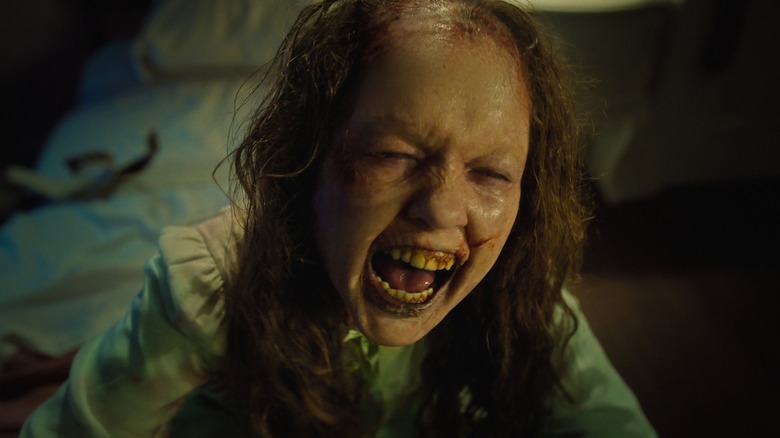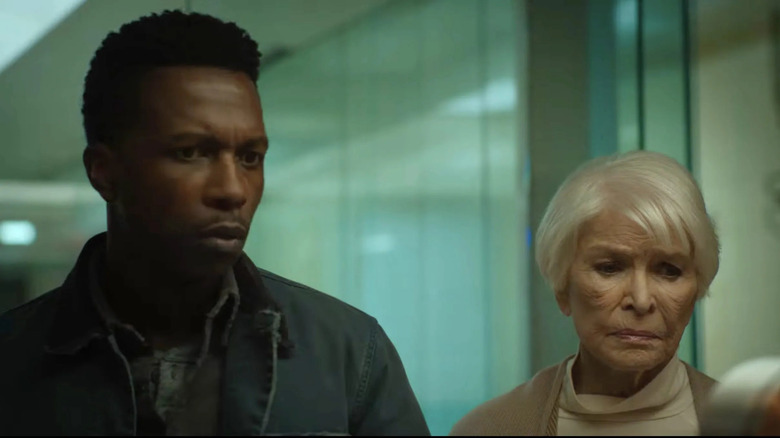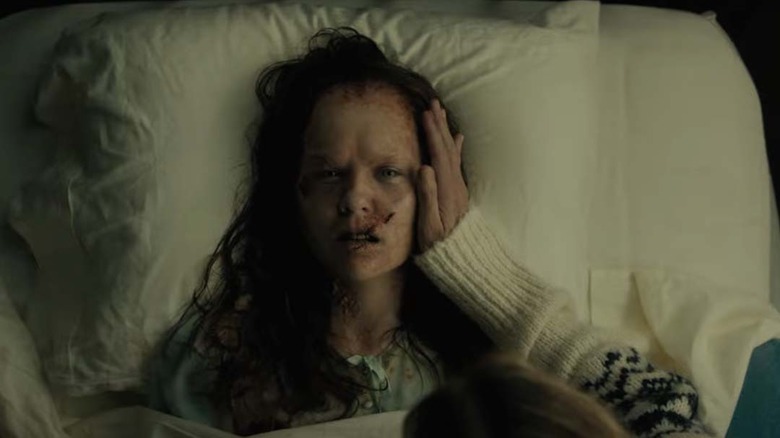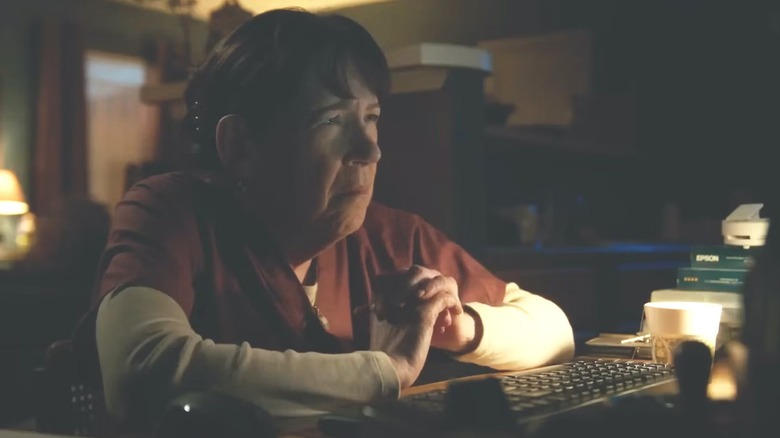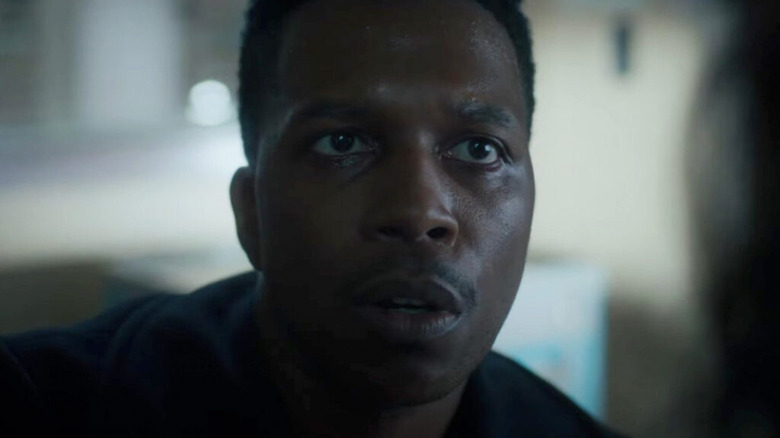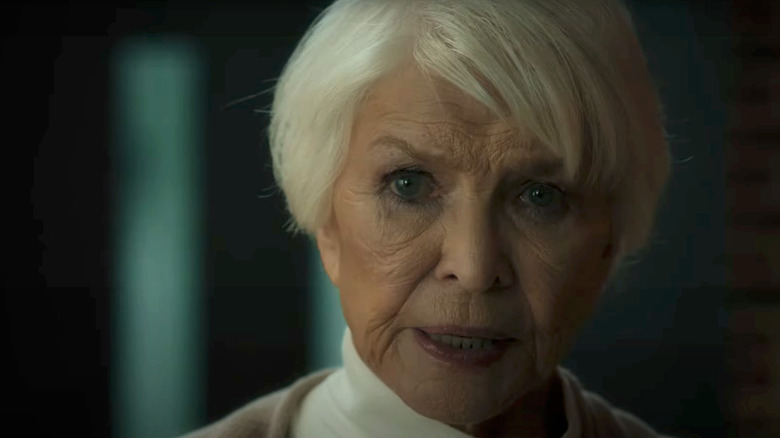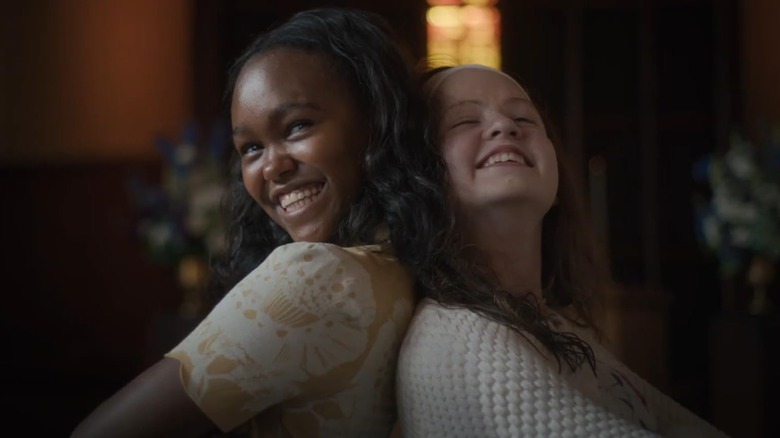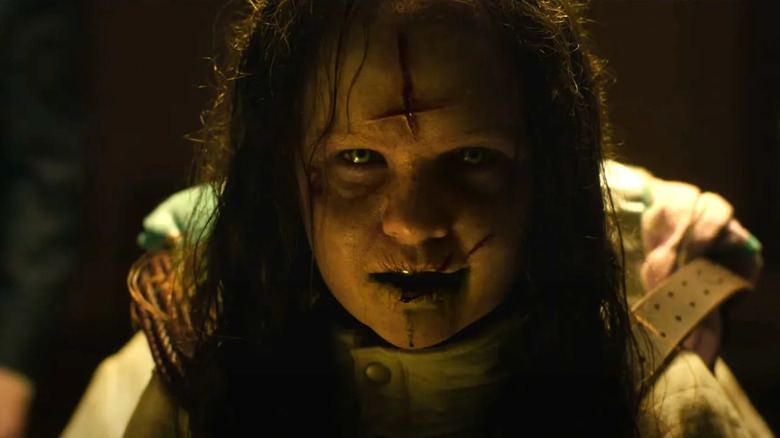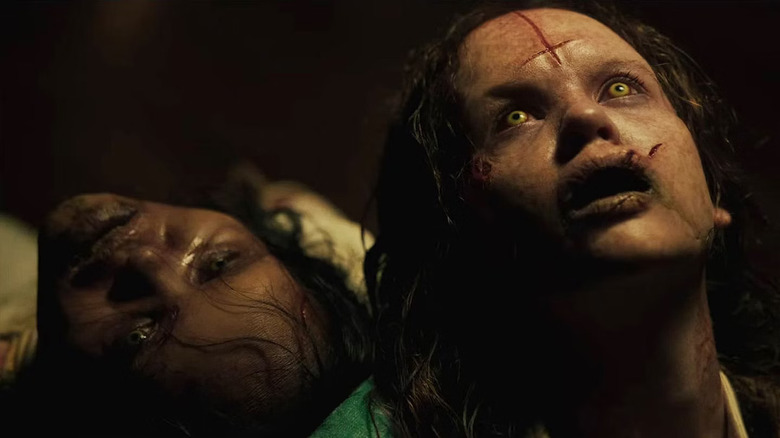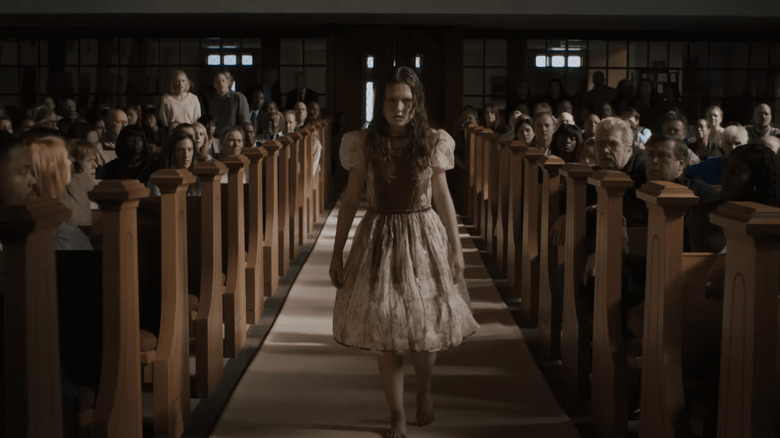The Ending Of The Exorcist: Believer Explained
Contains spoilers for "The Exorcist: Believer"
After delivering a new "Halloween" trilogy that continued the legacy of the original film, writer-director David Gordon Green shifts to "The Exorcist" franchise to start a new era with "The Exorcist: Believer." The film — both a series reboot and a direct sequel to William Friedkin's 1973 horror classic — follows single father Victor (Leslie Odom Jr.) as his daughter Angela (Lidya Jewett) and her friend Katherine (Olivia O'Neil) become possessed by a demonic force. As the demon's grip on the girls tightens and they lose control of themselves, Victor and Katherine's parents are forced to face the reality that they're dealing with a powerful evil and must seek higher help. So they pull together the best group of people they can to perform an exorcism on the girls and expel this demon before it causes irreversible damage.
"The Exorcist: Believer" starts a new chapter in the iconic horror franchise but doesn't leave the characters and story of the original film behind. Ellen Burstyn reprises her role as Chris MacNeil from the original and there are plenty of little nods and references that longtime fans will enjoy. Yet "Believer" still manages to establish its own storyline through a new story of parents coming to grips with their faith and this horrifying force that's possessed their children. Plus the film's ending is full of gut-wrenching turns that leave the door open for the story to continue. Let's look at the ending of "The Exorcist: Believer" and delve into its potential.
What you need to remember about the plot
Before we look at the ending, let's go over some important details leading up to the film's finale. Although Victor has constructed a happy life for Angela as a single father, he's haunted by the trauma of losing his wife Sorenne (Tracey Graves), who died in the catastrophic 2010 earthquake in Haiti while she was pregnant with Angela. Although Victor had the choice to save her, we're led to believe that he chose to save Angela since he couldn't save them both. Even though Angela has never met her mother, she still yearns to feel her presence. So Angela and her friend Katherine attempt to summon her through a ritual in the woods, but end up going missing for several days.
When they are eventually found, they have no memory of what happened and start to display disturbing behavior that causes their parents to believe that they've become possessed. Victor attempts to recruit Chris MacNeil –- who hasn't seen her daughter Regan from the original "The Exorcist" in years — to help them, but it only leads to Katherine stabbing Chris' eyes out. With few options remaining and the Catholic Church not wanting to step in, Victor and Katherine's parents decide to perform the exorcism themselves with the help of loving community members. Unfortunately, things don't go as planned and horrifying truths are unearthed.
What happens at the end of the movie
As the group attempts to rid the girls of this demon, it seems like nothing is working. They can't seem to do anything powerful enough to weaken the entity. Even when Father Maddox (E.J. Bonilla) arrives to assist the group, it only results in him being quickly killed. Eventually, the demon presents the group with a choice to only save one of the girls and reveals the truth behind Victor's choice to save his wife or Angela. It turns out that Victor actually chose to save Sorenne instead of his daughter. But –- through either the protection spell put on Angela while she was in the womb or a cruel twist of fate -– Victor's wife dies instead of Angela. So he never actually chose to keep Angela, with the demon saying that the Devil played a trick on him.
When it comes to choosing whether to save Angela or Katherine, both Victor and Katherine's mother Miranda (Jennifer Nettles) decide that they won't choose. Unfortunately, Katherine's father Tony (Norbert Lero Butz) screams that he wants to save Katherine. While it seems like his wish will be granted, the Devil plays another trick: Katherine dies and has her soul dragged into hell by demons while Angela is set free. The film ends on a monologue by Ann (Ann Dowd), Victor's neighbor and a former nun, about the importance of belief as we see glimpses of everyone's life after the exorcism.
What does the end of the movie mean?
"The Exorcist: Believer" depicts the conflict between waning belief and faith -– which isn't an uncommon theme for this franchise. Similar to how Father Damien Karras (Jason Miller) struggled with his belief in the original film, these elements are seen in Victor's personal arc. Because of what happened to his wife, Victor has lost his faith in God and denies the existence of anything involving the supernatural. However, instead of simply focusing on Victor restoring his faith as its central thematic thread, the film defines what faith and the power of belief really mean -– largely through Ann and her final monologue.
Ann delivers a modern perspective on faith that sees her discuss what the Devil is really after in people. Rather than wanting to simply extinguish happiness and joy, the Devil seeks to have people give up hope. Based on her own experience of being cast out for having an abortion while she was becoming a nun, Ann comes to realize that she and others simply need to remain faithful to truly rise above evil and tragedy. It's a message that's pretty relevant considering the chaos and hatred we see today in society and politics, and one that she takes to heart herself by stepping into a greater role that she never thought possible for herself during the exorcism. The mix of Ann's speech and subtle images of the others also accepting this concept help elevate the film's meaning.
Another possible explanation
Aside from the obvious impact of Katherine dying and being pulled into hell, there are a lot of lasting emotional and physical ramifications that emerge from the film's final exorcism sequence. Katherine's parents -– mainly her father -– likely feel a sense of regret and remorse for not saving their daughter, but show signs of working toward a better place. Although the emotion of that loss is surely crushing and will have a lasting effect on their family going forward, Katherine's parents look like they're going to be able to find a way to stay whole. While Katherine's father is initially sitting alone in a diner, looking defeated, there's a sense of hope that comes with the arrival of his wife.
As for Victor and Ann, their faith is restored and mended from this experience. Victor now knows that the supernatural — both good and bad — exists, and heads to his wife's grave to reconnect with the past he's tried to leave behind. He and Angela are able to talk freely about it and move forward together. Plus it seems like Angela can start anew following this incident, although she still misses Katherine. Ann now has a new perspective on herself and what her faith can achieve. Maybe this leads to her trying to be a nun again — potentially positioning her to lead the franchise going forward. The afternath for these characters is certainly considerable, but holds some glimmers of hope.
A tearful reunion
While Chris is sidelined after her eyes are stabbed out by a possessed Katherine, the film doesn't forget to conclude her arc. When Victor first meets Chris, she's still harboring resentment for the falling out between her and her daughter Regan. After Chris decided to publish a book about the experience of Regan being possessed, Regan decided to not speak to her again and now Chris has no idea where she's been after all this time. When fighting the demon, Chris is told that Regan is dead and that her soul is in hell, but she obviously doesn't believe what the demon tells her.
As the movie ends, Chris is visited by Regan in the hospital and the two share a tearful reunion that fans will love -– especially since Linda Blair reprises her role as Regan. The bigger question is what this will mean for the franchise going forward. Will Chris and Regan return in the sequels and play a larger role in the story? The door is certainly open for that and their continued presence in this new era of "The Exorcist" could help forge a stronger connection between these new films and the original.
Protective power
While the protective ritual done on Angela while she's in the womb at the start of the film might seem incidental or just a way for the film to elicit spiritual vibes, it potentially plays a bigger role in the film's finale. When the demon attempts to kill Angela as a part of the "deal" that's made, the entity is unsuccessful in the end. Although Angela's heart does stop beating for a bit, the demon eventually transfers to Katherine to kill her, and Angela ends up surviving. It's simply chalked up to the Devil playing a trick on everyone, but that could be a ruse entirely: the real reason the demon can't kill Angela might be because of that protective spell put on her.
The idea of the spell is to protect Angela from evil, so it would make sense that the demon would be unable to truly go through with killing her. But if you're wondering why the spell didn't protect Angela from being possessed in the first place if it's supposed to keep her safe, no real answer is provided. Perhaps it's something that later films will explain, or it's just a giant plot hole. For now, it's worth questioning the role that the protective spell plays in keeping Angela safe; maybe it will eventually be seen as a key to defeating the demon once and for all.
Tricky Devil
If the protective spell on Angela ends up having nothing to do with her being saved in the finale after all, then it's more evidence that this demon is very powerful and difficult to stop. Not only is it incredibly manipulative in the ways it compels people to believe its lies, and even mimics the voice and feelings of who it's controlling, but its supernatural powers can also lead to unspeakable horrors. But its ability to create false bargains and trick those trying to stop it is easily its most gut-wrenching and psychologically destructive power. The way it toys with its targets' expectations and makes them feel strong, only to cut them down in the next moment, is devastating.
Even worse, none of the spiritual and religious techniques used in the exorcism seemed to slow the demon down at all. Frankly, it only seems to become more powerful and in control as time goes on. It's worth wondering how or whether this demonic force can be destroyed. This question will likely be explored in the sequels, especially if the same entity returns to possess someone else. For now, this demon seems in many ways unstoppable.
Tight-knit communities
Fortunately, "The Exorcist: Believer" is about the strength of community, as Victor, Miranda, and Tony are aided by those around them in the finale. While most might expect that the Catholic Church would step in to save Katherine and Angela, they reject the opportunity to provide assistance. So — just as the exorcism is about to start — it seems like the two families are without help. Yet close neighbors and allies come to their aid and put their lives on the line to aid the two little girls. Throughout the film, there are subtle interactions and storylines that emphasize that communal sense of togetherness and allow these characters to discuss their religious perspective and put forward a helping hand.
But the finale is where that sense of love and community really comes together, as Victor's neighbors and supportive community members volunteer to help Katherine and Angela. It's a poignant portrayal of what being a tight-knit community means and what the power of a group of people who genuinely want to help one another looks like. They even bring in their own religious and cultural practices, to throw literally everything they can at the demon — which ultimately expands the film's spiritual lore. Even though we don't get to fully know some of the side characters present for the finale, the depiction of community is where the film's heart lies and is a big reason the finale packs an emotional punch.
What does the ending mean for the franchise?
Normally, we would sit here and debate what the ending of "The Exorcist: Believer" means for a potential sequel or the franchise's future. But we already know that this is only the beginning of a new chapter in "The Exorcist" franchise. Although the film's ending doesn't hint at a clear direction for the next entry, director David Gordon Green has already started talking about the next couple of movies — albeit without getting too specific.
Green basically has said that there's definitely a trilogy in the making, and told Collider that there are many story avenues they are looking at right now. "The idea is we built a road map that I think has so many different avenues that we could take. The world of exorcism and possession is so vast," said Green. "As the movie finds itself existing in the world over the next few weeks, I think a lot of those questions will be answered."
Once more fans see the film and start to point out story clues, perhaps a path forward will become clearer. All we know for sure right now is that there's a sequel to "Believer," currently titled "Deceiver," set to hit theaters in 2025. It's unknown who will return for it and what the story will be, but the best thing fans can do now is enjoy "Believer" and look for information on the sequel starting next year.
